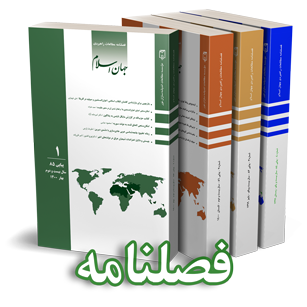زمینهها و پیامدهای حضور داعش در آسیای مرکزی
فصلنامه مطالعات راهبردي جهان اسلام، سال نوزدهم، شماره ۳، پياپي ۷۵، پاییز ۱۳۹۷؛ صفحات ۴۱-۶۸
چکیده
تحولات جدید به خصوص قدرت گرفتن گروههای تروریستی در غرب آسیا و به آشوب کشیدن کشورهایی همچون سوریه وعراق، شرایط نوینی را رقم زده که موجب بروز تغییر و تحولاتی در سیاست کشورهای آسیای مرکز نسبت به مسئله افراطگرایی و تروریسم شده است. یکی از این تحولات جدید، امکان ظهور و بروز گروه داعش در کشورهای آسیای مرکزی است. با توجه به اهمیت مسئله، نوشتار حاضر در پی پاسخگویی به این سؤال اساسی است که «چه زمینهها و پیامدهایی برای ظهور و بروز داعش در آسیای مرکزی میتوان متصور بود؟» به منظور پاسخگویی به این پرسش، ضمن بررسی عوامل داخلی و خارجی مؤثر بر ظهور و بروز داعش در منطقه پیامدهای فعالیتهای این گروه تروریستی نیز واکاوی شدهاند.
واژگان کلیدی
آسیای مرکزی، داعش، تروریسم، گروههای تروریستی، افغانستان
عنوان مقاله [English]
Context and Consequences of ISIS Presence
in Central Asia
نویسنده [English]
Shuaib Bahman
چکیده [English]
Abstract
New developments, particularly the power of the terrorist groups in Western Asia and the chaos of countries like Syria and Iraq, have created new conditions that have brought about changes in the policies of the Central Asian countries towards the issue of extremism and terrorism. One of these new developments is the possibility of the emergence of ISIS in Central Asia. Given the importance of the issue, the present article seeks to answer this fundamental question: “What are the implications and causes for the emergence of ISIS in Central Asia?” In order to answer this question, while investigating the internal and external factors affecting the emergence of ISIS in the region also studies the consequences of the activities of this terrorist group.
واژگان کلیدی[English]
Keywords
Central Asia, ISIS, Terrorism, Terrorist groups, Afghanistan
عنوان مقاله [العربية]
سیاق داعش و نتائجها فی آسیا الوسطی
چکیده [العربية]
المخلص
التطورات الجديدة، وخاصة قوة الجماعات الإرهابية في غرب آسيا وفوضى دول مثل سوريا والعراق، خلقت ظروفًا جديدة أحدثت تغييرات في سياسات بلدان آسيا الوسطى تجاه قضية التطرف والإرهاب. أحد هذه التطورات الجديدة هو احتمال ظهور داعش في آسيا الوسطى. بالنظر إلى أهمية المشكلة، تسعى هذه المقالة إلى الإجابة عن هذا السؤال الأساسي: “ما هي الآثار والأسباب التي أدت إلى ظهور داعش في آسيا الوسطى؟” من أجل الإجابة على هذا السؤال، ضمن التحقيق في العوامل الداخلية والخارجية التي تؤثر على ظهور داعش في المنطقة، أیضا تسعی دراسات نتایج أنشطة هذه المجموعة الإرهابية.
الكلمات المفتاحية
آسيا الوسطى، داعش، الإرهاب، الجماعات الإرهابية، أفغانستان
ـ بهرام. نادين، ۲۰۱۳، شورشيان تاجيکستان در سوريه امنيت کشورشان را به خطر انداختهاند، آسياي ميانه آنلاين، ۳ دسامبر
ـ سلطانوف. عسکر و سعدي. شاکر، ۲۰۱۳، تحقيقات آسياي ميانه درباره اينکه چه کسي شهروندان را به سوريه ميکشاند، آسياي ميانه آنلاين، ۱۳ فوريه
ـ محمداف. قاسم بيک، ۱۳۹۲، سلفيگري در آسياي مرکزي/ معجزه دلار آمريکايي يا ريال سعودي؟، خبرگزاري فارس، ۸ بهمن
– GLOBAL DATA,OVERALL TREND, 2017, 2006-2017, The Fund for Peace,
– Kazantsev. Andrey, 2016, Central Asia: Secular Statehood Challenged by Radical Islam, Russia in Global Affairs, 1 february
– Mudallali. Amal, 2012, Russia’s Fear of Radical Islam Drives Its Support for Assad, Al-Monitor, 26 July
– Number of IS fighters in Afghanistan declined by more than half, 29 Jul, 2016
– Scarfo. Ashley, 2018, Terror Threat Turns Inward on Central Asia, Terrorism Monitor, The Jamestown Foundation, Volume: 16, 3 December
– Sonali. Huria, 2008, Failing and Failed States The Global Discourse, Institute of Peace and Conflict Studies, New Delhi,developing an alternative framework for peace and security in the region, NO 75,
– tvnews.af, 2016, Number of IS fighters in Afghanistan declined by more than half, Jul 29
– Yemelianova. Galina M., 2007, The Rise of Islam in Muslim Eurasia: Internal Determinants and Potential Consequences, China and Eurasia Forum Quarterly, Volume 5, No. 2,
– Иванов. И.С., ۲۰۱۳, Интересы России в Центральной Азии: содержание, перспективы, ограничители, Российский Совет по Международным Делам, № ۱۰, ۳ апреля




